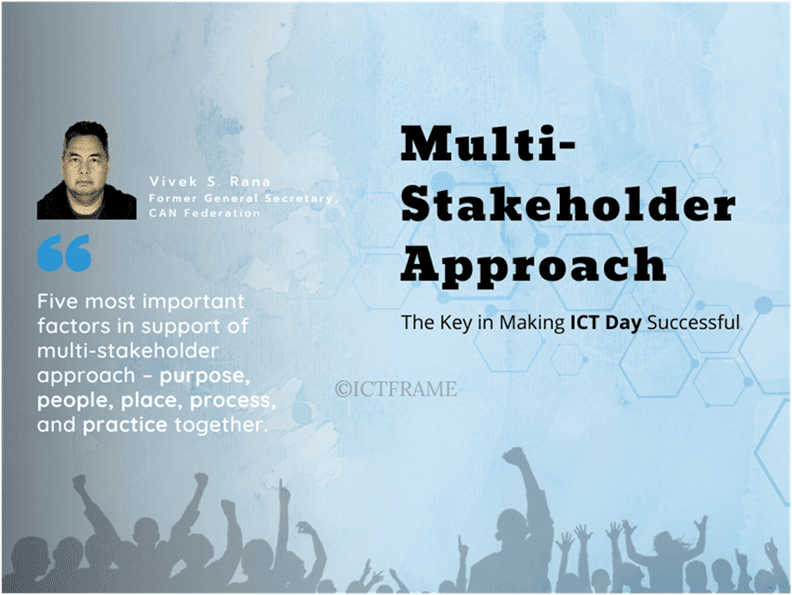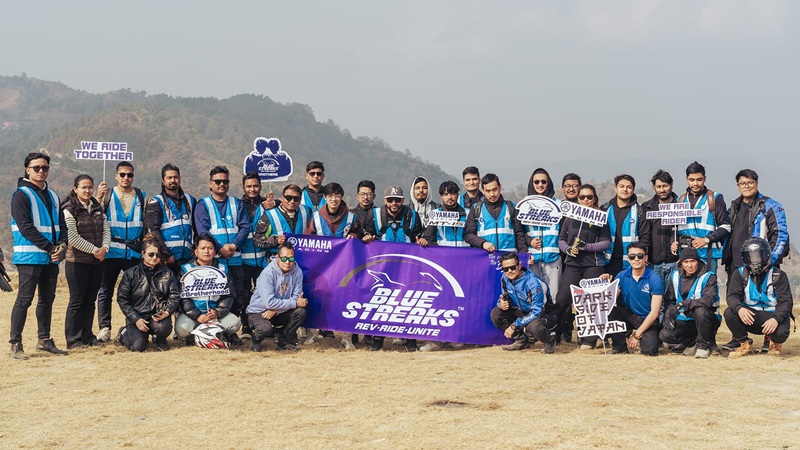Multistakeholderism, The Key in Making Nepal ICT Day Successful
Kathmandu, May 2nd, 2020
The multi-stakeholder model consists of discussion and collaboration from diverse sectors. It incorporates the private sector, the academic sector, civil society, the technical community, and the government sector.
Nepal is celebrating its 3rd official ICT Day on May 2, 2020. On the occasion of the National ICT Day, Vivek S. Rana – Former General Secretary at the CAN Federation writes:
“Information communication technologies (ICTs) is omnipresent – from Businesses to Zoos involving many aspects of the populace from all works of life – from government agencies, non-government organizations, students, industry worker, IT colleges, Universities, politicians, Business houses, civil society, technical community, academia, and many different groups.
Many businesses, governments, and communities have started to learn that collaboration can be just a powerful force for change as competition, transforming even the most intractable situation. In order for ICT stay to be a collaborative endeavor a multi-stakeholder environment and teaching the value of patiently cultivating a relationship, developing a collaborative process, and discovering the possibilities of a common group for collective action is the essence. No matter how difficult the challenge one can always find people, associations, or stakeholder groups to generate an effective outcome.
At the core of any multi-stakeholder collaboration are, naturally, stakeholder values. Having the best possible participants on one’s side – in terms of diversity, dedication, and capacity is crucial. The place where they come together to dialogue is another critical component, as is the thought and care that go into designing the overall process. Not only must this process galvanize stakeholder commitment, but it must also create possibilities of discovering mutual interests, generating future scenarios, building new relationships, and fostering new thinking. In therefore creating a multi-stakeholder partnership for ICT day in Nepal we will need to bring together five most important factors in support of multi-stakeholder approach – purpose, people, place, process, and practice together.
As economists amplify about the economy, from an ICT professional perspective my belief is that ICT is too important an issue for a country to leave it in the hands of one particular stakeholder. A multi-stakeholder approach will be a key to making ICT day successful in Nepal in days to come.”
You May Also Like: National ICT Day 2020: Role in ICT Awareness
Interview with Vivek S. Rana (Former General Secretary, Computer Association of Nepal)
“Firstly, I want to clear things up by saying the PPP (Public-Private Partnership) model doesn’t apply here. This is not a construction or a development endeavor. The civil society and other sectors don’t fall in this model. Thus, I am hinting towards collaboration through a multi-stakeholder approach bringing all key stakeholders together.
Currently, we gather some sense of public-private partnerships to mark the ICT day since the endorsement by the government. In my view, we should go forward by switching to a multi-stakeholder environment to celebrate ICT as it impacts a wider audience not just the Government and the private sector.
The stakeholders must come together to carry out discussions on ICT day awareness programs, implementations, policy-making, and activities. The issues of ICT should be addressed in order to create the demands of ICT rather than only concentrating on the supply side. The outcome of the discussion and consensus will lead to the betterment of ICT uptake. I am a great believer in the crowd taking a thoughtful decision than a handful of experts in these issues.
When a diverse group or sector comes together to discuss the issues regarding the availability of the infrastructures, applications, services (for example; the internet), they can put forward different viewpoints. That is exactly why we need to take a holistic approach in ICT by implementing a multi-stakeholder environment.”
You May Also Like: The Digital Nepal Movement of the Government
Q. What is the core purpose of celebrating ICT Day?
There are varying opinions of different individuals on why we should celebrate the ICT day. I believe the core purpose of this day is to commemorate the contribution of ICT in the world and discuss its positive impact in our future. The impacts of ICT are not limited to just technological development. In fact, ICT incorporates political impact, economic impact, and social impact.
We are still unable to conduct outcome-based, impactful events to mark the ICT day celebration. Events are orchestrated to make speakers hero but fail to deliver the message to the masses. Over 66% of the general populace (ITU Statistics Data 2017) are left out from the Internet outreach and such important messages do not get to these masses.
Raising awareness is one aspect to mark this day and another is to track the influence, deployment, and development of the ICT sector. So, on this very day, we should mark the accomplishment of ICT and plan on widening its scope in the nation narrowing the economical and social divide and not just the digital divide.
Final Thought
The government may be the largest and powerful organization in the nation but it can’t focus on developing ICT infrastructure alone. Multistakeholderism allows the discussion to be diverse which will ultimately help to govern the aspects of ICT. ICT infrastructures have become integral parts of every sector and that’s why the contribution and voice of every stakeholder matters.
Do you agree with the concept of Multistakeholderism as the way forward towards Digital Nepal? Let us know in the comments!








